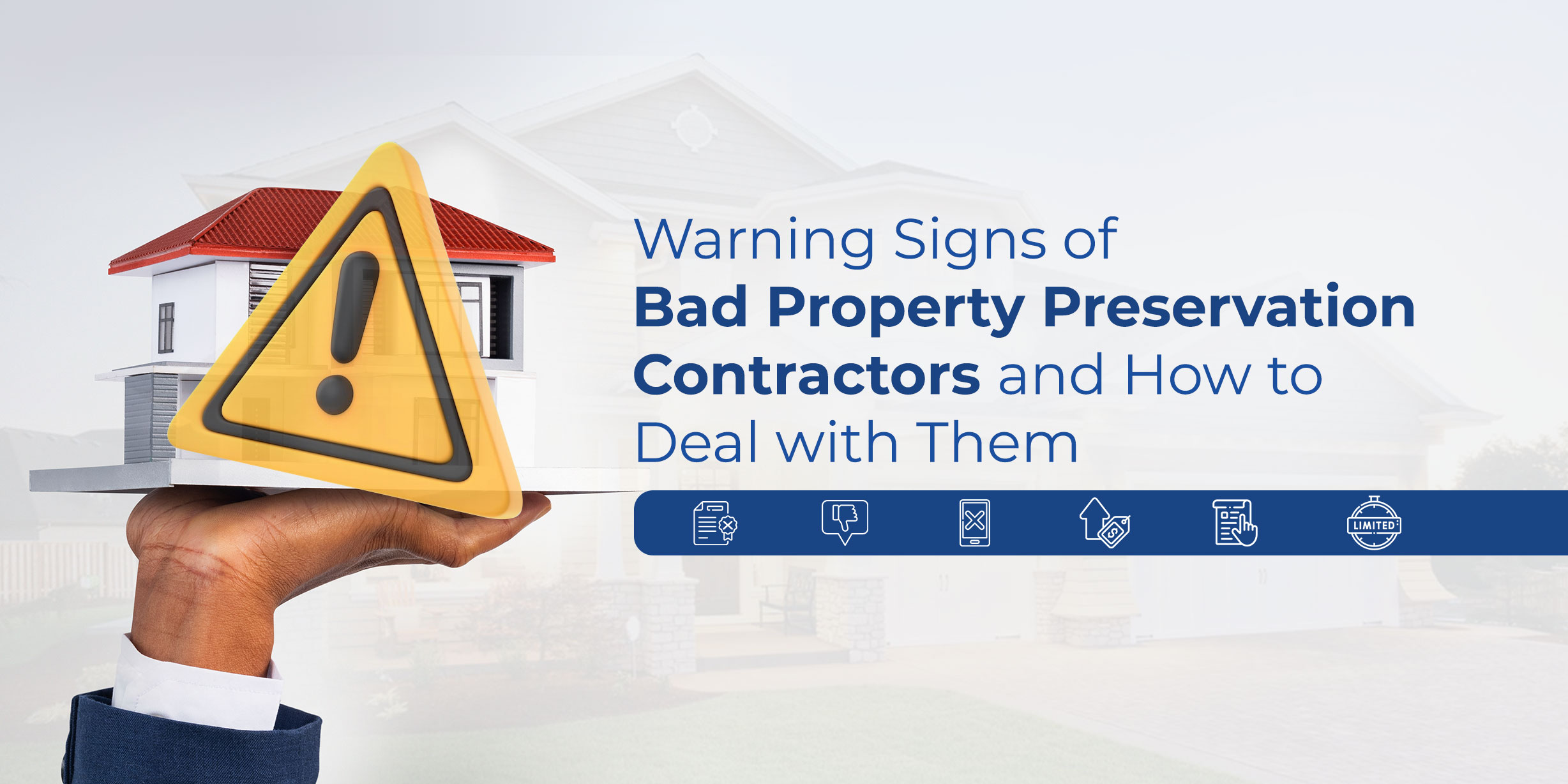The US property preservation market is going through a period of churn. The pandemic has hit the industry hard, with property preservation inspectors unable to visit sites in person or adhere to the weekly or monthly schedule. In addition to delays, the Great Resignation and an aging workforce led to a labor shortage. There were also demand crests to deal with – the CARES Act brought down the number of foreclosures, but as the period of relief ends, foreclosures are expected to rise again.
Amid these challenging market conditions, it is not always easy to find the best contractor for property preservation management. Mortgage providers may go by word of mouth or limit their search to familiar vendors who may not provide high-quality property preservation services. That is why it is important to watch out for the following red flags when selecting a property preservation contractor:
1. The vendor is not properly certified
Most states in the US require property preservation contractors to be certified and have all the relevant licenses. In some areas, they may even need to invest in insurance facilities before they can become a certified contractor. The absence of requisite certifications (both mandatory and value-adding) is a red flag. It means that the contractor is not focused on growing their business beyond the here and now and may expose you to compliance loopholes later on.
Read more: Can Mortgage Automation Help Detect and Prevent Fraud in 2022?
2. There are no previous client testimonials
The vendor you choose for property preservation management should come with a robust set of testimonials. The absence of testimonials indicates that previous customers may have had a bad experience, which the contractor is unwilling to reveal or they could be extremely new to the market, in which case one must tread carefully. New and rising contractors are not necessarily a warning sign – one must then do due diligence and ensure all parameters are met before vendor selection.
3. Response times and support quality is poor
Property preservation management is a collaborative effort and you need a contractor with strong verbal communication skills, sufficient availability, and short response times for queries. Depending on the location of a property and your business HQ, you may be working with them across time zones. In such scenarios, the contractor must be able to provide reliable support, both in real-time and through records and documentation.
4. The contractor is being outpriced by the competition
If a contractor is getting much lower-than-average work orders in a high-demand market, then it is a definite warning sign. It means that other contractors are providing equivalent or better quality property preservation services at a lower price. However, some vendors may deal with very large work orders that are fewer in number. As a mortgage business, you should assess and filter contractors by their work volumes using these parameters.
5. They rely on legacy technology
Today, technology plays a massive role in property preservation management, from workflow automation and streamlined work orders to automated document reviews and even property inspections using drones. A contractor with no or very little technology capabilities is a red flag. It means that they will struggle to scale beyond a point, may not be able to fulfill complex orders, and will provide you with an overall sub-par client experience.
6. You can obtain only a limited set of services
Finally, it is preferable to work with a property preservation management company that can provide a whole gamut of services under one umbrella. They may, in turn, employ specialized contractors for inspections, repairs, maintenance, etc. – but the partner you choose to work with directly should not provide only one or two services. This will only increase your vendor management workloads and make order management much more complex.
Read more: Have You Undertaken a Cyber Security Risk Assessment in 2022 Yet?
How to Deal with a Bad Property Preservation Contractor
There are several ways you can deal with a bad property preservation contractor if you have already signed up for their services. Some contractors may have a bond policy for an insurance company, which becomes applicable in case of client disputes. If the contractor performs badly, you can file a bond claim with the insurance provider, which will reimburse you for any losses incurred. In the case of licensed contractors, one will need to file a complaint with the licensing board.
Another way to deal with a bad contractor is to simply leave them a negative review. This may not improve their performance or help you recoup losses, but it will prevent other clients from getting exposed to a similar experience. Better Business Bureau is one such forum where you can register public reviews and complaints.
Finally, the best way to deal with a bad property preservation contractor is to replace them – or prevent the partnership in the first place. That is why mortgage businesses need a robust outsourcing policy, which makes it easier to obtain bids, screen potential contractors, and select companies that perfectly intersect competitive pricing and comprehensive services with industry knowledge and technology expertise.
At Nexval, we are a certified partner to mortgage businesses, with a team of 1000+ subject matter experts that deliver tailored solutions for your property preservation needs. We ensure delivery of consistent and compliant property preservation support services while allowing you to focus on recruiting a reliable onshore contractor to maintain foreclosed properties. Speak with our Tech Gurus to learn how.



